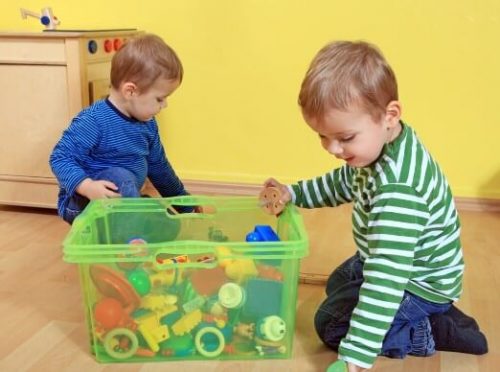8 Guidelines to Educate Children Through Proactivity

Even though it’s not easy to educate children through proactivity, it’s possible. It’s all a matter of applying the right tools and being creative (and clever) to achieve the desired results.
Of course, it’s also necessary for us to be motivated so that our children feel happy and excited to learn. Childhood is a crucial stage to lay the foundations of education and overall development.
As a mother, the important thing is that you know how to guide your children through this process. It’s important to make the necessary corrections, give a good example, and be open to talking to them when things get hard.
Through discipline, you’ll be able to educate your children through proactivity. Discipline is a value that promotes self-control and responsibility – two great assets to have when wanting to reach our goals. It can also help us in the decision-making process.
8 guidelines to educate children through proactivity
1. Set boundaries
The first step to educate children through proactivity is moderating expectations. One thing is keeping children motivated, and another is imposing our ideas or concepts.
Once you have that clear, it’s necessary to establish healthy boundaries to help children avoid having a single point of view. Children need to know what you expect from them so they can make a distinction between what they want and your expectations.
On the other hand, you should also keep in mind that boundaries are established to avoid or reduce challenging behaviors. Setting limits helps children have the confidence and freedom to take healthy risks.

2. Responsibilities
Teaching children to take responsibility for their actions and behaviors will help them recognize their faults, improve them and not get discouraged by them. Additionally, their self-esteem will remain intact and they’ll pass their good mood and energy onto other children.
If you delegate responsibilities to your children, you’ll be educating them in a proactive way through positive behaviors, actions, and choices. Accountability means there’s a justification for every action and decision. Don’t hesitate to talk to them about the importance of taking accountability for what they say and do.
3. Inform them
Another important aspect when educating children through proactivity is to inform them about your expectations. Do this not only for them to be responsible for themselves, but for them to realize to what extent they should pay attention to what others think.
4. Guidance techniques
Guidance is the way you can solve problems, direct behaviors, and actions. As a mother, you should use guidance techniques that support your child’s positive behaviors.
The goal of these techniques is to promote behaviors that are positive and adaptable, and reduce ones that are challenging. Applying them will allow you to teach your children appropriate behaviors. They’ll also help you resolve conflicts and deal with any difficulties you may find along the way.
5. Listen with empathy
Another important guideline to educate children through proactivity is empathic listening. This can help develop and strengthen children’s thinking skills. In addition, listening to your children will help you find the best solutions to every problem.
Listening to your children with empathy generates trust because they feel like you actually care about what they’re saying. They feel heard, considered, and respected. As a mother, you must be careful not to turn their messages into evaluations, opinions or advice.
6. Prioritize behavior
Whether at school or with any activity that your children carry out, you should always prioritize their behaviors instead of the results they get.
In fact, demanding a specific result makes children feel stressed and pressured, making it even more difficult for them to meet your expectations. Make sure to teach them that the process can be even more enriching than achieving the goal.
7. Show authority
When children grow with a certain level of authority at home, they learn to be responsible and independent from a very young age. They also learn to control their aggressive impulses and don’t let other people’s opinions affect their self-esteem.
This parenting style provides a balance between setting appropriate boundaries, supporting through guidance, and giving independence to children.

8. Work and perseverance
Lastly, when wanting to educate children through proactivity, it’s important that you make your children understand that effort is always rewarded. Teach them that nothing can be achieved without effort and hard work, and that it may be difficult at first, but it’ll be worth it in the end.
Make them understand that working is what makes us useful to society. This is definitely an essential concept that you should teach your children so they always keep it in mind when setting a goal. That way, they’ll remember to continue working for what they want no matter how hard things get.
Even though it’s not easy to educate children through proactivity, it’s possible. It’s all a matter of applying the right tools and being creative (and clever) to achieve the desired results.
Of course, it’s also necessary for us to be motivated so that our children feel happy and excited to learn. Childhood is a crucial stage to lay the foundations of education and overall development.
As a mother, the important thing is that you know how to guide your children through this process. It’s important to make the necessary corrections, give a good example, and be open to talking to them when things get hard.
Through discipline, you’ll be able to educate your children through proactivity. Discipline is a value that promotes self-control and responsibility – two great assets to have when wanting to reach our goals. It can also help us in the decision-making process.
8 guidelines to educate children through proactivity
1. Set boundaries
The first step to educate children through proactivity is moderating expectations. One thing is keeping children motivated, and another is imposing our ideas or concepts.
Once you have that clear, it’s necessary to establish healthy boundaries to help children avoid having a single point of view. Children need to know what you expect from them so they can make a distinction between what they want and your expectations.
On the other hand, you should also keep in mind that boundaries are established to avoid or reduce challenging behaviors. Setting limits helps children have the confidence and freedom to take healthy risks.

2. Responsibilities
Teaching children to take responsibility for their actions and behaviors will help them recognize their faults, improve them and not get discouraged by them. Additionally, their self-esteem will remain intact and they’ll pass their good mood and energy onto other children.
If you delegate responsibilities to your children, you’ll be educating them in a proactive way through positive behaviors, actions, and choices. Accountability means there’s a justification for every action and decision. Don’t hesitate to talk to them about the importance of taking accountability for what they say and do.
3. Inform them
Another important aspect when educating children through proactivity is to inform them about your expectations. Do this not only for them to be responsible for themselves, but for them to realize to what extent they should pay attention to what others think.
4. Guidance techniques
Guidance is the way you can solve problems, direct behaviors, and actions. As a mother, you should use guidance techniques that support your child’s positive behaviors.
The goal of these techniques is to promote behaviors that are positive and adaptable, and reduce ones that are challenging. Applying them will allow you to teach your children appropriate behaviors. They’ll also help you resolve conflicts and deal with any difficulties you may find along the way.
5. Listen with empathy
Another important guideline to educate children through proactivity is empathic listening. This can help develop and strengthen children’s thinking skills. In addition, listening to your children will help you find the best solutions to every problem.
Listening to your children with empathy generates trust because they feel like you actually care about what they’re saying. They feel heard, considered, and respected. As a mother, you must be careful not to turn their messages into evaluations, opinions or advice.
6. Prioritize behavior
Whether at school or with any activity that your children carry out, you should always prioritize their behaviors instead of the results they get.
In fact, demanding a specific result makes children feel stressed and pressured, making it even more difficult for them to meet your expectations. Make sure to teach them that the process can be even more enriching than achieving the goal.
7. Show authority
When children grow with a certain level of authority at home, they learn to be responsible and independent from a very young age. They also learn to control their aggressive impulses and don’t let other people’s opinions affect their self-esteem.
This parenting style provides a balance between setting appropriate boundaries, supporting through guidance, and giving independence to children.

8. Work and perseverance
Lastly, when wanting to educate children through proactivity, it’s important that you make your children understand that effort is always rewarded. Teach them that nothing can be achieved without effort and hard work, and that it may be difficult at first, but it’ll be worth it in the end.
Make them understand that working is what makes us useful to society. This is definitely an essential concept that you should teach your children so they always keep it in mind when setting a goal. That way, they’ll remember to continue working for what they want no matter how hard things get.
All cited sources were thoroughly reviewed by our team to ensure their quality, reliability, currency, and validity. The bibliography of this article was considered reliable and of academic or scientific accuracy.
- Bas, E. (2014). Educar para innovar: La innovación como cultura. Juventud, proactividad, creatividad, participación y visión de futuro compartida. Revista de estudios de juventud, 104, 11-30. http://www.injuve.es/sites/default/files/RevistaEstudiosJuventud104.pdf#page=12
- Valverde, S. C., Urbano, L. P., Tárrega, M. P., Rivera, N. S., Sánchez, M. C. S., & D’Almeida, R. S. (2018). La proactividad en el ámbito escolar. LA PROACTIVIDAD EN EL ÁMBITO ESCOLAR. http://quadernsdigitals.net/datos_web/hemeroteca/r_1/nr_858/a_11500/11500.pdf#page=5
This text is provided for informational purposes only and does not replace consultation with a professional. If in doubt, consult your specialist.








